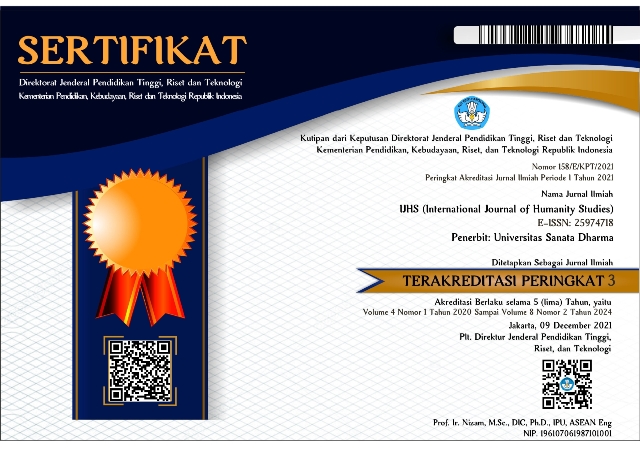DIASPORA-INDONESIAN LITERATURE WORKS OF INDONESIAN IMMIGRANTS IN AMERICA IN THE 2010s
(1) Universitas Sanata Dharma
(2) Sanata dharma Univerity
(3) Sanata Dharma University
(*) Corresponding Author
Abstract
Keywords
Full Text:
PDFReferences
Aji, G. Fajar Sasmita. 2014. Dunia Baru dalam Omeros karya Derek Walcott dan The Enigma of Arrival Karya VS Naipaul: Kajian Poskolonial. Disertasi. Fakultas Ilmu Pengetahuan Budaya Program Studi Ilmu Susastra, Universitas Indonesia.
Anwar Holid , 2010, Diaspora Orang Indonesia di Amerika Serikat dalam http://halamanganjil.blogspot.com/2010/06/diaspora-orang-indonesia-di-amerika.html
Amir, Badaruddin. 2009. Membaca Realitas Sosial di Indonesia Melalui Sastra Diaspora dalam https://badaruddinamir.wordpress.com/2009/10/12.
Ashcroft, Bill, dkk. 2003. Menelanjangi Kuasa Bahasa: Teori dan Praktik Sastra Poskolonial. Yogyakarta: Qalam.
Bachtiar, Imelda (ed.). 2015. Diaspora Indonesia: Bakti untuk Negeriku. Jakarta: Kompas.
Bandel, Katrin. 2013. Sastra Nasionalisme Pascakolonial. Yogyakarta: Pustaka Hariana.
Braziel, Jana Evans dan Anita Mannur (ed.). 2007. Theorizing Diaspora. USA, UK, Australia: Blackwell Publishing.
Bressler, Charles E., 2007. Literary Cristicism: An Introduction to Theory and Practice (Fourth Edition). New Jersey: Pearson Prentice Hall.
Budianta, Melani, 2006. Budaya, Sejarah, dan Pasar: New Historicism dalam Perkembangan Kritik Sastra dalam Susastra: Jurnal Ilmu Sastra dan Budaya. Jakarta: Himpunan Sarjana-Kesusastraan Indonesia dan Yayasan Obor.
Budiman, Arip. 2010. K-Video: Only a Girl, Menantang Phoenix dan Ziarah Batin Lian Gouw dalam http//:kabarinews.com/k-video-only-a-girl-menantang phoenix-dan ziarah-batin-lian-gouw/35787.
Cohen, Robin. 2008. Global Diasporas: An Introduction. London & New York: Roudledge.
Coopel, Charles A. 1994. Tionghoa Indonesia dalam Krisis. Jakarta: Pustaka Sinar Harapan.
Foulcher, Keith dan Tony Day. 2006. Clearing A Space: Kritik Pasca Kolonial tentang Sastra Indonesia Modern. Jakarta: Yayasan Obor Indonesia KITLV Jakarta.
Geertz, Clifford, 1973. "Thick Description: Toward an Interpretive Theory of Culture?" in The Interpretation of Cultures: Selected Essays. New York:Basic Books.
Hall, Stuart. 2003. Cultural Indentity and Diaspora dalam In Theorizing Diaspora (ed. Jana Evans dan Anita Mannur). Malden: Blackwell Publishing.
Hau, Caroline S. 2000. An Anthology of Chinese Filipino Writing. Philipines: Capitol Publishing Houses.
Holid, Anwar. 2010.Diaspora Orang Indonesia dalam http//:halamanganjil.blogspot.com/2010/06/diaspora-orang-indonesia-di-amerika.html.
Ling-Chi, wang dan Wang Gungwu (eds.). 2003. The Chinese Diaspora: Selected Essays (Volume I dan II). London: Eastern University Press.
Geertz, Clifford, 1973. "Thick Description: Toward an Interpretive Theory of Culture?" in The Interpretation of Cultures: Selected Essays. New York:Basic Books.
Klemm, David E., 1983. The Hermeneutical Theory of Paul Ricoeur. London and Toronto: Associated University Presses.
Ratna, Nyoman Kutha. 2004. Teori, Metode, dan Teknik Penelitian Sastra dari Strukturalisme hingga Postruktural. Jakarta: Pustaka Pelajar.
Soekisman, W.D. 1975. Masalah Cina di Indonesia. Jakarta: Bangun Indah.
Suryadinata, Leo. 1984. Dilema Minoritas Tionghoa. Jakarta: Grafiti Press.
-----------------------.1985. Politik Tionghoa Peranakan di Jawa. Jakarta: Pustaka Sinar Harapan.
Vasanty, Puspa. 1988. "Kebudayaan Orang Tionghoa" dalam Manusia dan Kebudayaan di Indonesia (ed. Koentjaraningrat). Jakarta: Djambatan.
Weedon, Chris. 2004. Identity and Culture. New York: Open University Press.
Widjajanti Dharmowijoyo, 2011. Only a Girl: Menantang Phoenix dalam Bijdragen tot de Tall, Land, en Volkenkunde Vol 167, No.1, pp. 106-108.
Wijayanti, Dita dan N.K. Mirahayuni, 2014, An Analysis Of Translation Strategies For Non-Equivalence Used In Lian Gouws Novel Only A Girl And Its Indonesian Version Only A Girl-Menantang Phoenix dalam Parafrase Vol. 14 No.01 Februari 2014, pp. 31-37.
Yu-te (Tom) Kuo. Peranakan Self as a Diasporic Palimpset: Shirley Geok-lin Lim Torn between Diaspora and Nostalgia dalam Colloquim on Diaspora and Asian Fiction Dispora in Literature. http//:Zephyr.edu.tw../diaspora%2002.
DOI: https://doi.org/10.24071/ijhs.v1i2.979
Refbacks
- There are currently no refbacks.
Copyright (c) 2018 Peni Adji, Sri Mulyani, Ni Luh Putu Rosiandani
Indexed and abstracted in:
IJHS Sinta 3 Certificate (S3 = Level 3)
International Journal of Humanity Studies (IJHS) has been nationally accredited Sinta 3 by the Ministry of Education, Culture, Research and Technology of the Republic of Indonesia based on the decree No. Surat Keputusan 158/E/KPT/2021. Validity for 5 years: Vol 4 No 1, 2020 till Vol 8 No 2, 2024

This work is licensed under CC BY-SA.
Creative Commons Attribution-ShareAlike 4.0 International License.
p-ISSN: 2597-470X (since 31 August 2017); e-ISSN: 2597-4718 (since 31 August 2017)
Notice: The opinions expressed in this publication are those of the authors. They do not purport to reflect the opinions or views of the editorial team or publishers.
International Journal of Humanity Studies (IJHS) is a scientific journal in English published twice a year, namely in September and March, by Sanata Dharma University, Yogyakarta, Indonesia.

















